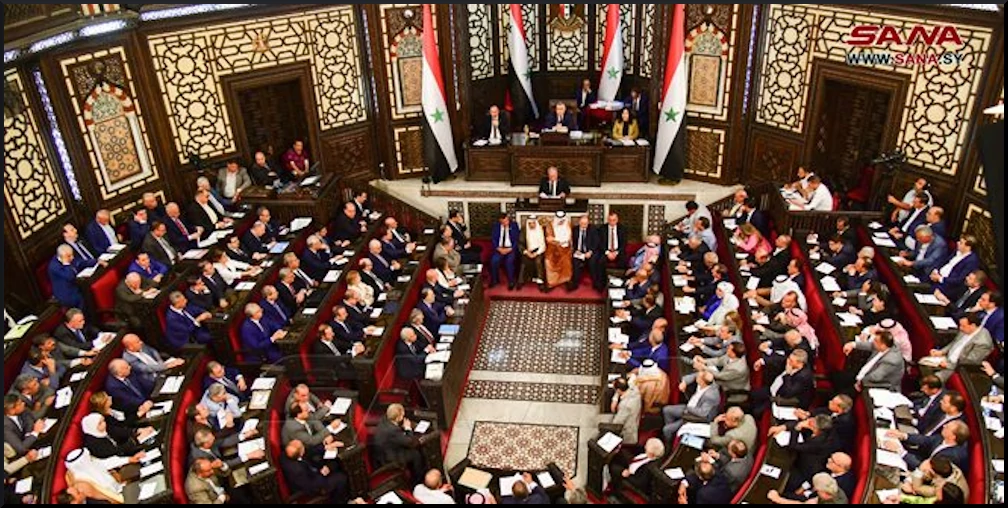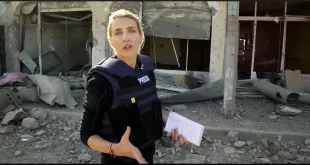published on The Syrian Observer, Tuesday July 25th, 2023
In an extraordinary session of the “People’s Assembly” dedicated to examining the economic and living conditions and the exchange rate of the pound, Prime Minister of the Syrian regime, Hussein Arnous, shed light on the government’s approach to tackling the challenges in the exchange and financing market, thus justifying the collapse of the Syrian pound. The session took place on Monday, July 24.
Arnous attributed the instability of the exchange rate to five primary factors. Firstly, he pointed out the wide funding gap between the country’s requirements for energy carriers, wheat, foodstuffs, and medicines, as well as production necessities, and the limited quantities available at the disposal of the Central Bank of Syria.
The Prime Minister mentioned that the government’s economic committee had held a series of meetings during the past month, where they analyzed and identified the most significant factors influencing the exchange rate. These factors ranged from cumulative structural reasons to emerging emergency reasons, and he categorized them as follows:
-
- Stressful economic factors arising from imbalances in the Syrian economy due to both external and internal reasons.
- The impact of external psychological and media factors played a major role in causing artificial fluctuations in the exchange rate of the lira. This was further exacerbated by speculative operations in local and neighbouring markets, making it challenging to address using conventional monetary tools or procedures.
- The deficit financing policy employed to cover the government’s administrative expenses. This policy led to the accumulation of budget deficits and a rise in internal public debt, resulting in inflationary levels that pose a significant threat to overall economic stability.
- Scarcity of the Central Bank of Syria’s foreign exchange resources due to the decline in the government’s economic and financial situation and the reduced revenues from sectors supplying foreign exchange, such as tourism, oil, industry, and strategic industries.
- Negative impact of parallel demand for foreign exchange to finance smuggled goods, leading to increased smuggling activity and posing a threat to the currency.
Contrasting these reasons, Arnous mentioned a series of decisions and draft legislative instruments aimed at improving the availability of foreign exchange and supporting the business sector. These decisions include:
Counter policies
Arnous suggested a series of decisions and draft legislative instruments aimed at supporting the business sector and streamlining import financing. The key features of the proposals are outlined in numbered points, and they involve allocating foreign exchange, determining materials to be funded, allowing importers to self-finance certain items, restructuring the platform committee, setting a one-year duration for its work, reviewing import lists, and addressing ministries for foreign exchange sources. Additionally, it mentions studying different scenarios for government support.
-
- Allocating foreign exchange available at the Central Bank of Syria to finance essential materials.
- Determining a list of secondary materials to be funded by exchange companies within a maximum delay of 15 days, with predetermined exchange rate movement margins.
- Allowing importers to self-finance the remaining items on the import lists, which constitute the majority of imported materials, bypassing the need to use the existing “platform.”
- Restructuring the platform committee to consist only of the Central Bank of Syria governor and representatives of duly licensed exchange companies, aligning with institutional protocols.
- Setting a one-year duration for the Platform Committee’s work, with periodic reports to the Economic Committee detailing its mechanisms and proposing performance improvements to ensure proper functionality.
- The Economic Committee has reviewed import lists and streamlined them to meet the minimum necessary requirements for national economic activity, consumption, and production needs.
- Addressing all ministries through official letters accompanied by clear data matrices, requesting identification of sources for foreign exchange generation within the country. The special focus is on sectors such as tourism, geological and mineral resources, agriculture, and food industries.
- Studying various scenarios for managing government support.
Despite these efforts, the Syrian pound experienced a sharp and rapid devaluation within a span of just two weeks. On July 11, the US dollar surpassed ten thousand pounds for the first time in the history of the currency, initiating an accelerated deterioration process.
The “Pound Today” website, specializing in monitoring foreign currency rates, reported the selling price of the US dollar on Monday, July 24th, at 12,200 Syrian pounds, and its purchase price at 12,050 pounds.
Manaf Quman, an economic researcher at the “Omran Center for Strategic Studies,” expressed that the regime lacks the financial capacity to inject money into the market. He observed that such measures over the years have only depleted cash reserves without yielding significant medium and long-term benefits.
Quman attributed the rapid decline of the Syrian pound to the regime’s realization that its allied countries no longer provide the support they once did. Credit lines and financial aid have become scarce, exacerbating the economic challenges faced by the country.
from ATHR PRESS, a Pro-government newspaper
 Syria Support Movement solidarity with the Syrian people
Syria Support Movement solidarity with the Syrian people





